- Home
- Josephine Tey
The Franchise Affair ag-3
The Franchise Affair ag-3 Read online
The Franchise Affair
( Alan Grant - 3 )
Josephine Tey
Marion Sharpe and her mother seem an unlikely duo to be found on the wrong side of the law. Quiet and ordinary, they have led a peaceful and unremarkable life at their country home, The Franchise. Unremarkable that is, until the police turn up with a demure young woman on their doorstep. Not only does Betty Kane accuse them of kidnap and abuse, she can back up her claim with a detailed description of the attic room in which she was kept, right down to the crack in its round window. But there's something about Betty Kane's story that doesn't quite add up. Inspector Alan Grant of Scotland Yard is stumped. It takes Robert Blair, solicitor turned amateur detective, to solve the mystery that lies at the heart of The Franchise Affair.
The Franchise Affair
Josephine Tey
1
It was four o'clock of a spring evening; and Robert Blair was thinking of going home.
The office would not shut until five, of course. But when you are the only Blair, of Blair, Hayward, and Bennet, you go home when you think you will. And when your business is mostly wills, conveyancing, and investments your services are in small demand in the late afternoon. And when you live in Milford, where the last post goes out at 3.45, the day loses whatever momentum it ever had long before four o'clock.
It was not even likely that his telephone would ring. His golfing cronies would by now be somewhere between the fourteenth and the sixteenth hole. No one would ask him to dinner, because in Milford invitations to dinner are still written by hand and sent through the post. And Aunt Lin would not ring up and ask him to call for the fish on his way home, because this was her bi-weekly afternoon at the cinema, and she would at the moment be only twenty minutes gone with feature, so to speak.
So he sat there, in the lazy atmosphere of a spring evening in a little market town, staring at the last patch of sunlight on his desk (the mahogany desk with the brass inlay that his grandfather had scandalised the family by bringing home from Paris) and thought about going home. In the patch of sunlight was his tea-tray; and it was typical of Blair, Hayward, and Bennet that tea was no affair of a japanned tin tray and a kitchen cup. At 3.50 exactly on every working day Miss Tuff bore into his office a lacquer tray covered with a fair white cloth and bearing a cup of tea in blue-patterned china, and, on a plate to match, two biscuits; petit-beurre Mondays, Wednesdays and Fridays, digestive Tuesdays, Thursdays and Saturdays.
Looking at it now, idly, he thought how much it represented the continuity of Blair, Hayward, and Bennet. The china he could remember as long as he could remember anything. The tray had been used when he was very small by the cook at home to take the bread in from the baker, and had been rescued by his young mother and brought to the office to bear the blue-patterned cups. The cloth had come years later with the advent of Miss Tuff. Miss Tuff was a war-time product; the first woman who had ever sat at a desk in a respectable solicitor's in Milford. A whole revolution Miss Tuff was in her single gawky thin earnest person. But the firm had survived the revolution with hardly a jolt, and now, nearly a quarter of a century later, it was inconceivable that thin grey dignified Miss Tuff had ever been a sensation. Indeed her only disturbance of the immemorial routine was the introduction of the tray-cloth. In Miss Tuff's home no meal was ever put straight on to a tray; if it comes to that, no cakes were ever put straight on to a plate; a tray-cloth or a doyley must intervene. So Miss Tuff had looked askance at the bare tray. She had, moreover, considered the lacquered pattern distracting, unappetising, and "queer." So one day she had brought a cloth from home; decent, plain, and white, as befitted something that was to be eaten off. And Robert's father, who had liked the lacquer tray, looked at the clean white cloth and was touched by young Miss Tuff's identification of herself with the firm's interests, and the cloth had stayed, and was now as much a part of the firm's life as the deed-boxes, and the brass plate, and Mr. Heseltine's annual cold.
It was when his eyes rested on the blue plate where the biscuits had been that Robert experienced that odd sensation in his chest again. The sensation had nothing to do with the two digestive biscuits; at least, not physically. It had to do with the inevitability of the biscuit routine; the placid certainty that it would be digestive on a Thursday and petit-beurre on a Monday. Until the last year or so, he had found no fault with certainty or placidity. He had never wanted any other life but this: this quiet friendly life in the place where he had grown up. He still did not want any other. But once or twice lately an odd, alien thought had crossed his mind; irrelevant and unbidden. As nearly as it could be put into words it was: "This is all you are ever going to have." And with the thought would come that moment's constriction in his chest. Almost a panic reaction; like the heart-squeezing that remembering a dentist appointment would cause in his ten-year-old breast.
This annoyed and puzzled Robert; who considered himself a happy and fortunate person, and adult at that. Why should this foreign thought thrust itself on him and cause that dismayed tightening under his ribs? What had his life lacked that a man might be supposed to miss?
A wife?
But he could have married if he had wanted to. At least he supposed he could; there were a great many unattached females in the district, and they showed no signs of disliking him.
A devoted mother?
But what greater devotion could a mother have given him than Aunt Lin provided; dear doting Aunt Lin.
Riches?
What had he ever wanted that he could not buy? And if that wasn't riches he didn't know what was.
An exciting life?
But he had never wanted excitement. No greater excitement, that is, than was provided by a day's hunting or being all-square at the sixteenth.
Then what?
Why the "This is all you are ever going to have" thought?
Perhaps, he thought, sitting staring at the blue plate where the biscuits had been, it was just that Childhood's attitude of something-wonderful-tomorrow persisted subconsciously in a man as long as it was capable of realisation, and it was only after forty, when it became unlikely of fulfilment, that it obtruded itself into conscious thought; a lost piece of childhood crying for attention.
Certainly he, Robert Blair, hoped very heartily that his life would go on being what it was until he died. He had known since his schooldays that he would go into the firm and one day succeed his father; and he had looked with good-natured pity on boys who had no niche in life ready-made for them; who had no Milford, full of friends and memories, waiting for them; no part in English continuity as was provided by Blair, Hayward, and Bennet.
There was no Hayward in the firm nowadays; there had not been one since 1843; but a young sprig of the Bennets was occupying the back room at this moment. Occupying was the operative word, since it was very unlikely that he was doing any work; his chief interest in life being to write poems of an originality so pristine that only Nevil himself could understand them. Robert deplored the poems but condoned the idleness, since he could not forget that when he had occupied that same room he had spent his time practising mashie shots into the leather arm-chair.
The sunlight slipped off the edge of the tray and Robert decided it was time to go. If he went now he could walk home down the High Street before the sunlight was off the east-side pavement; and walking down Milford High Street was still one of the things that gave him conscious pleasure. Not that Milford was a show-place. It could be duplicated a hundred times anywhere south of Trent. But in its unselfconscious fashion it typified the goodness of life in England for the last three hundred years. From the old dwelling-house flush with the pavement that housed Blair, Hayward, and Bennet and had been built in the last years of Ch
arles the Second's reign, the High Street flowed south in a gentle slope-Georgian brick, Elizabethan timber-and-plaster, Victorian stone, Regency stucco-to the Edwardian villas behind their elm trees at the other end. Here and there, among the rose and white and brown, appeared a front of black glass, brazening it out like an overdressed parvenu at a party; but the good manners of the other buildings discounted them. Even the multiple businesses had dealt leniently with Milford. True, the scarlet and gold of an American bazaar flaunted its bright promise down at the south end, and daily offended Miss Truelove who ran the Elizabethan relic opposite as a tea-shop with the aid of her sister's baking and Ann Boleyn's reputation. But the Westminster Bank, with a humility rare since the days of usury, had adapted the Weavers Hall to their needs without so much as a hint of marble; and Soles, the wholesale chemists, had taken the old Wisdom residence and kept its tall surprised-looking front intact.
It was a fine, gay, busy little street, punctuated with pollarded lime trees growing out of the pavement; and Robert Blair loved it.
He had gathered his feet under him preparatory to getting up, when his telephone rang. In other places in the world, one understands, telephones are made to ring in outer offices, where a minion answers the thing and asks your business and says that if you will be good enough to wait just a moment she will "put you thrrrough" and you are then connected with the person you want to speak to. But not in Milford. Nothing like that would be tolerated in Milford. In Milford if you call John Smith on the telephone you expect John Smith to answer in person. So when the telephone rang on that spring evening in Blair, Hayward, and Bennet's it rang on Robert's brass-and-mahogany desk.
Always, afterwards, Robert was to wonder what would have happened if that telephone call had been one minute later. In one minute, sixty worthless seconds, he would have taken his coat from the peg in the hall, popped his head into the opposite room to tell Mr. Heseltine that he was departing for the day stepped out into the pale sunlight and been away down the street. Mr. Heseltine would have answered his telephone when it rang and told the woman that he had gone. And she would have hung up and tried someone else. And all that followed would have had only academic interest for him.
But the telephone rang in time; and Robert put out his hand and picked up the receiver.
"Is that Mr. Blair?" a woman's voice asked; a contralto voice that would normally be a confident one, he felt, but now sounded breathless or hurried. "Oh, I am so glad to have caught you. I was afraid you would have gone for the day. Mr. Blair, you don't know me. My name is Sharpe, Marion Sharpe. I live with my mother at The Franchise. The house out on the Larborough road, you know."
"Yes, I know it," Blair said. He knew Marion Sharpe by sight, as he knew everyone in Milford and the district. A tall, lean, dark woman of forty or so; much given to bright silk kerchiefs which accentuated her gipsy swarthiness. She drove a battered old car, from which she shopped in the mornings while her white-haired old mother sat in the back, upright and delicate and incongruous and somehow silently protesting. In profile old Mrs. Sharpe looked like Whistler's mother; when she turned full-face and you got the impact of her bright, pale, cold, seagull's eye, she looked like a sibyl. An uncomfortable old person.
"You don't know me," the voice went on, "but I have seen you in Milford, and you look a kind person, and I need a lawyer. I mean, I need one now, this minute. The only lawyer we ever have business with is in London-a London firm, I mean-and they are not actually ours. We just inherited them with a legacy. But now I am in trouble and I need legal backing, and I remembered you and thought that you would—"
"If it is your car—" Robert began. "In trouble" in Milford meant one of two things; an affiliation order, or an offence against the traffic laws. Since the case involved Marion Sharpe, it would be the latter; but it made no difference because in neither case was Blair, Hayward, and Bennet likely to be interested. He would pass her on to Carley, the bright lad at the other end of the street, who revelled in court cases and was popularly credited with the capacity to bail the Devil out of hell. ("Bail him out!" someone said, one night at the Rose and Crown. "He'd do more than that. He'd get all our signatures to a guinea testimonial to the Old Sinner.")
"If it is your car—"
"Car?" she said, vaguely; as if in her present world it was difficult to remember what a car was. "Oh, I see. No. Oh, no, it isn't anything like that. It is something much more serious. It's Scotland Yard."
"Scotland Yard!"
To that douce country lawyer and gentleman, Robert Blair, Scotland Yard was as exotic as Xanadu, Hollywood, or parachuting. As a good citizen he was on comfortable terms with the local police, and there his connection with crime ended. The nearest he had ever come to Scotland Yard was to play golf with the local Inspector; a good chap who played a very steady game and occasionally, when it came to the nineteenth, expanded into mild indiscretions about his job.
"I haven't murdered anyone, if that is what you are thinking," the voice said hastily.
"The point is: are you supposed to have murdered anyone?" Whatever she was supposed to have done this was clearly a case for Carley. He must edge her off on to Carley.
"No; it isn't murder at all. I'm supposed to have kidnapped someone. Or abducted them, or something. I can't explain over the telephone. And anyhow I need someone now, at once, and—"
"But, you know, I don't think it is me you need at all," Robert said. "I know practically nothing about criminal law. My firm is not equipped to deal with a case of that sort. The man you need—"
"I don't want a criminal lawyer. I want a friend. Someone who will stand by me and see that I am not put-upon. I mean, tell me what I need not answer if I don't want to, and that sort of thing. You don't need a training in crime for that, do you?"
"No, but you would be much better served by a firm who were used to police cases. A firm that—"
"What you are trying to tell me is that this is not 'your cup of tea'; that's it, isn't it?"
"No, of course not," Robert said hastily. "I quite honestly feel that you would be wiser—"
"You know what I feel like?" she broke in. "I feel like someone drowning in a river because she can't drag herself up the bank, and instead of giving me a hand you point out that the other bank is much better to crawl out on."
There was a moment's silence.
"But on the contrary," Robert said, "I can provide you with an expert puller-out-of-rivers; a great improvement on my amateur self, I assure you. Benjamin Carley knows more about defending accused persons than anyone between here and—"
"What! That awful little man with the striped suits!" Her deep voice ran up and cracked, and there was another momentary silence. "I am sorry," she said presently in her normal voice. "That was silly. But you see, when I rang you up just now it wasn't because I thought you would be clever about things" ("Wasn't it, indeed," thought Robert) "but because I was in trouble and wanted the advice of someone of my own sort. And you looked my sort. Mr. Blair, do please come. I need you now. There are people from Scotland Yard here in the house. And if you feel that it isn't something you want to be mixed up in you could always pass it on to someone else afterwards; couldn't you? But there may be nothing after all to be mixed up in. If you would just come out here and 'watch my interests' or whatever you call it, for an hour, it may all pass over. I'm sure there is a mistake somewhere. Couldn't you please do that for me?"
On the whole Robert Blair thought that he could. He was too good-natured to refuse any reasonable appeal-and she had given him a loophole if things grew difficult. And he did not, after all, now he came to think of it, want to throw her to Ben Carley. In spite of her betise about striped suits he saw her point of view. If you had done something you wanted to get away with, Carley was no doubt God's gift to you; but if you were bewildered and in trouble and innocent, perhaps Carley's brash personality was not likely to be a very present help.
All the same, he wished as he laid down the receiver that the front he pr
esented to the world was a more forbidding one-Calvin or Caliban, he did not care, so long as strange females were discouraged from flinging themselves on his protection when they were in trouble.
What possible kind of trouble could «kidnapping» be, he wondered as he walked round to the garage in Sin Lane for his car? Was there such an offence in English law? And whom could she possibly be interested in kidnapping? A child? Some child with «expectations»? In spite of the large house out on the Larborough road they gave the impression of having very little money. Or some child that they considered «ill-used» by its natural guardians? That was possible. The old woman had a fanatic's face, if ever he saw one; and Marion Sharpe herself looked as if the stake would be her natural prop if stakes were not out of fashion. Yes, it was probably some ill-judged piece of philanthropy. Detention "with intent to deprive parent, guardian, etc., of its possession." He wished he remembered more of his Harris and Wilshere. He could not remember off-hand whether that was a felony, with penal servitude in the offing, or a mere misdemeanour. "Abduction and Detention" had not sullied the Blair, Hayward, and Bennet files since December 1798, when the squire of Lessows, much flown with seasonable claret, had taken the young Miss Gretton across his saddle-bow from a ball at the Gretton home and ridden away with her through the floods; and there was no doubt at all, of course, as to the squire's motive on that occasion.
Ah, well; they would no doubt be open to reason now that they had been startled by the irruption of Scotland Yard into their plans. He was a little startled by Scotland Yard himself. Was the child so important that it was a matter for Headquarters?
Round in Sin Lane he ran into the usual war but extricated himself. (Etymologists, in case you are interested, say that the «Sin» is merely a corruption of "sand," but the inhabitants of Milford of course know better; before those council houses were built on the low meadows behind the town the lane led direct to the lovers' walk in High Wood.) Across the narrow lane, face to face in perpetual enmity, stood the local livery stable and the town's newest garage. The garage frightened the horses (so said the livery stable), and the livery stable blocked up the lane continually with delivery loads of straw and fodder and what not (so the garage said). Moreover the garage was run by Bill Brough, ex-R.E.M.E., and Stanley Peters, ex-Royal Corps of Signals; and old Matt Ellis, ex-King's Dragoon Guards, looked on them as representatives of a generation which had destroyed the cavalry and an offence to civilisation.

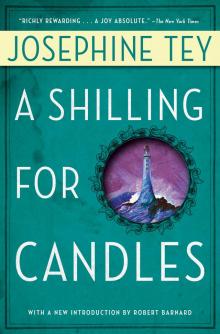 A Shilling for Candles
A Shilling for Candles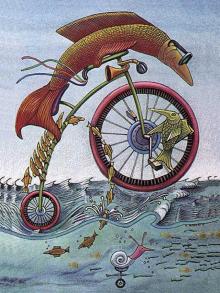 The Singing Sands
The Singing Sands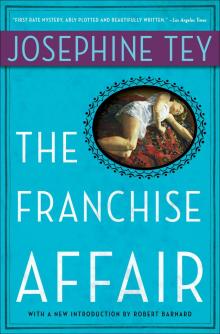 The Franchise Affair
The Franchise Affair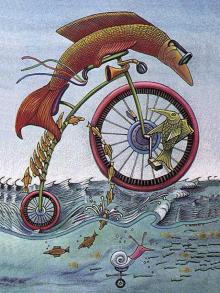 Daughter of Time
Daughter of Time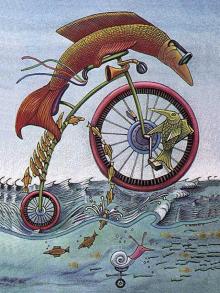 To Love and Be Wise
To Love and Be Wise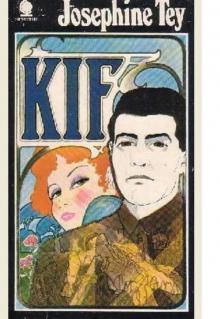 Kif
Kif The Expensive Halo: A Fable Without Moral
The Expensive Halo: A Fable Without Moral The Privateer
The Privateer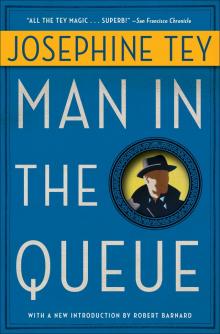 The Man in the Queue
The Man in the Queue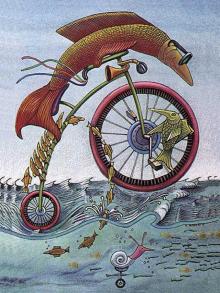 Miss Pym Disposes
Miss Pym Disposes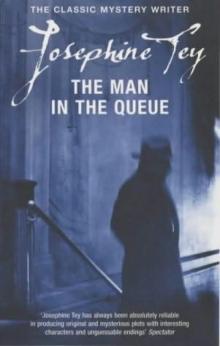 The Man in the Queue ag-1
The Man in the Queue ag-1 Brat Farrar
Brat Farrar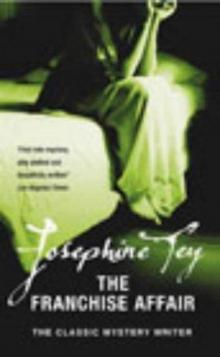 The Franchise Affair ag-3
The Franchise Affair ag-3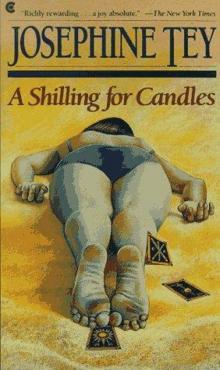 A Shilling for Candles ag-2
A Shilling for Candles ag-2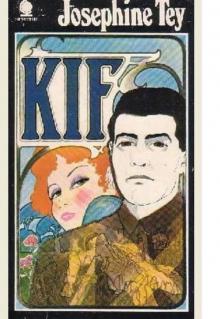 Kif: An Unvarnished History
Kif: An Unvarnished History The Expensive Halo
The Expensive Halo The Singing Sands ag-6
The Singing Sands ag-6 To Love and Be Wise ag-4
To Love and Be Wise ag-4